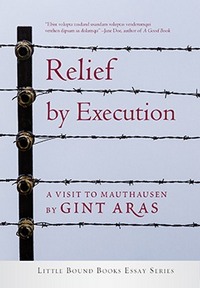 |
Relief by Execution: A Visit to Mauthausenby Gint Aras eARC, 94 pg. Read: September 21, 2019 |

This is a short book (long essay), that to really get into would render the reading of the content pointless, so I’ve got to hold back some of what I want to say. The official blurb is a good starting point for a few thoughts I have in reaction to this essay:
Between the years of 1996-1999, Gint Aras lived a hapless bohemian’s life in Linz, Austria. Decades later, a random conversation with a Polish immigrant in a Chicago coffeehouse provokes a question: why didn’t Aras ever visit Mauthausen, or any of the other holocaust sites close to his former home? The answer compels him to visit the concentration camp in the winter of 2017, bringing with him the baggage of a childhood shaped by his family of Lithuanian WWII refugees.
Thus far, I’m on board with it—Aras blends recollections of the visit with glimpses of his past—the racism, the abuse, the ways of thinking that he was raised in, and then applying that to American society. I think this is a solid idea, but not terribly uncommon. What makes this better is the perspective Aras brings to it. Rather than identifying with the inmates, the victims of the holocaust; he puts himself in the shoes of the guards, of the soldiers carrying out the orders that those of us separated by a distance of miles, years and context can’t imagine.
Or, as the blurb concludes:
The result is this meditative inquiry, at once lyrical and piercing, on the nature of ethnic identity, the constructs of race and nation, and the lasting consequences of collective trauma.
It’s this part that I found wanting. The length of this essay didn’t work for me — Aras either spent too much time on things he didn’t properly develop, or he spent too much time talking about things that didn’t add enough value to the essay. Either fully developing things—which would probably take another 50 or so pages (just a guess)—or trimming about half the length to give a tighter, more controlled argument would have made this a stronger piece of writing.
I enjoyed the writing generally, but too often (not really frequently, but not rarely enough) his writing got in the way of what he was trying to do. His style was too elaborate, his vocabulary obfuscated, and he just got in his own way.
Lastly, I think the essay would’ve been better served with more about his actual time in Mauthausen.
In summary, I think this is a great concept, but I couldn’t get behind the execution—often overwritten, and either too short or too long. Still, this is worth your time. You’ll end up thinking about things in a different way, which is always beneficial. It’s a short read. It’s a compelling read. Sure, it’s a problematic read—but the positives outweigh that.
Disclaimer: I received this eARC from the author via Lori @ TNBBC Publicity in exchange for this post—thanks to both for this.
![]()





Read Irresponsibly, but please Comment Responsibly